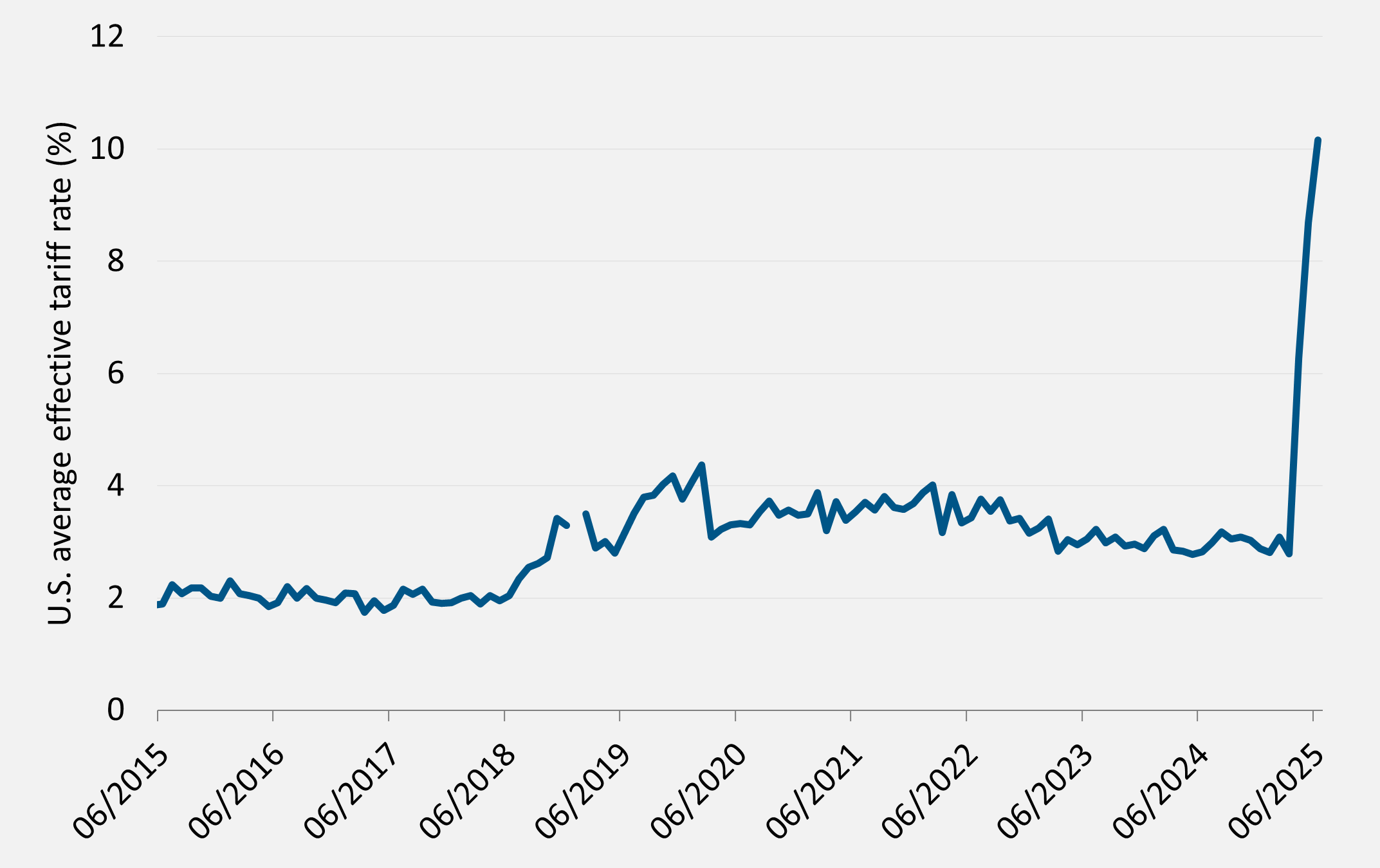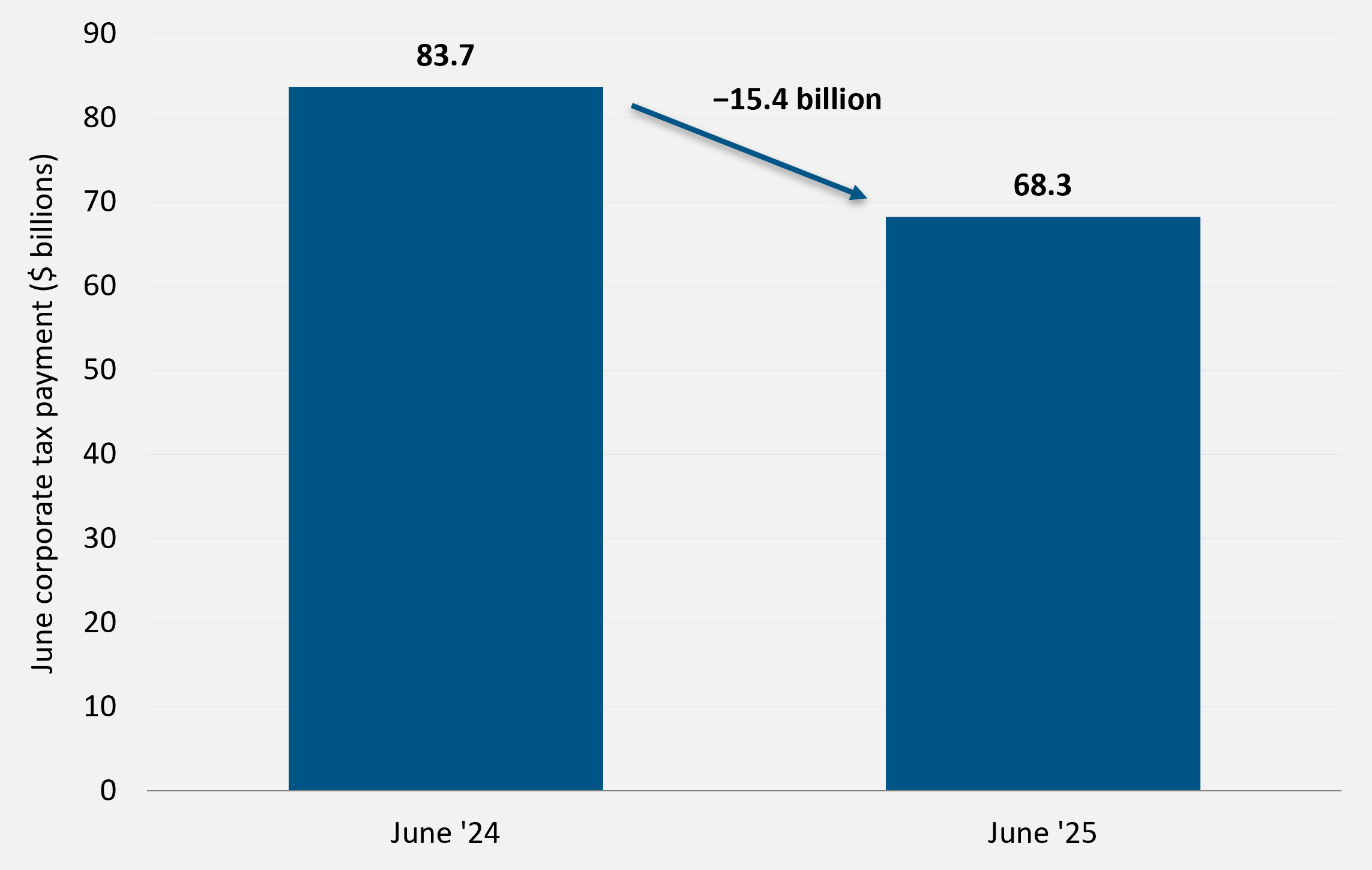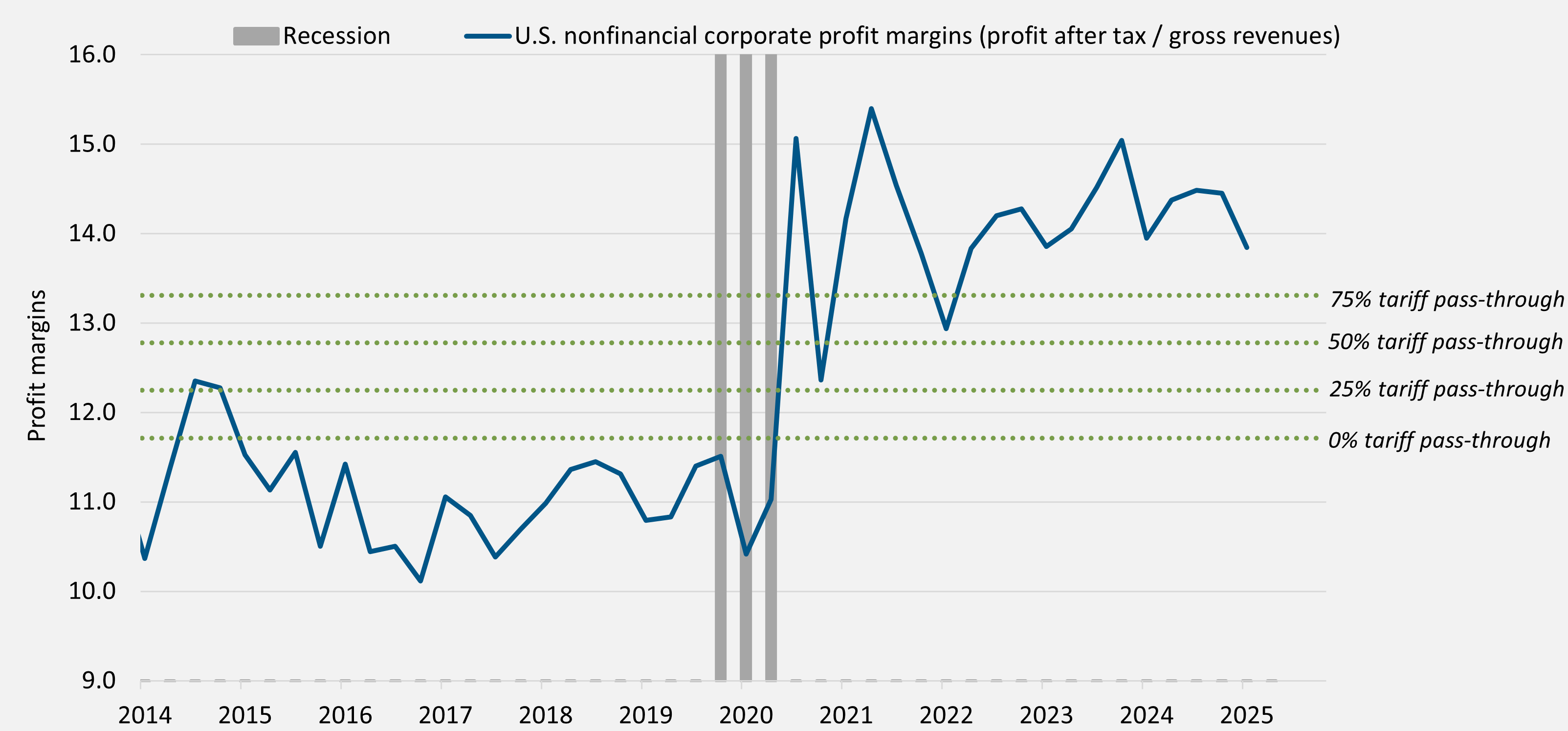Macro Signposts | 16 July 2025
The Economic Impact of
U.S. Tariffs: Waiting, Watching, and Planning
Since
January, the Trump administration has imposed broad tariffs - both across-the-board and targeted - with
more likely to follow. At the same time, Congress - with the administration's encouragement - has passed
legislation to reduce business and household income taxes.
When and how the U.S. economy
adjusts to this new regime is still an open question.
Current conventional wisdom is that
domestic households ultimately will pay a good portion of the tariffs as businesses charge higher prices
to offset the higher cost of imports. In turn, higher prices that reduce disposable incomes are expected
to reduce real consumption and weigh on near-term economic activity. Over time, greater incentives to
invest domestically could provide an offset.
However, after three months of higher tariffs,
data suggest that businesses' pass-through of higher tariffs via higher prices has been slow and uneven.
Corporate profits appear to be absorbing more of the additional costs, at least so far. While businesses
could still adjust prices and labor costs, which could weigh on aggregate incomes, the post-pandemic
surge in corporate margins and the front-loaded tax incentives in the One Big Beautiful Bill Act (OBBB)
may prompt more gradual adjustments.
The upshot is that the near-term impact of this year's
policy changes - slower growth, higher inflation - could be milder than expected, making it easier for
the Federal Reserve to resume its shift toward neutral monetary policy. The downside is that lower
corporate profits could lead to tighter financial conditions before the new tax and tariff regime
incentives foster the capital expenditures needed for the economy to shift away from its reliance on
consumption.
History provides a guide
The scale and scope of the Trump
administration's tariff policies are unprecedented in modern times. These policies have already raised
the average effective tariff rate that the U.S. currently charges on imports to roughly 11% (from less
than 3% in 2024 - see Figure 1), based on Treasury data. In the second half of the year, we expect that
number to increase further when additional sectoral and possibly higher reciprocal tariffs are
implemented. The closest analog for an industrial economy is the Smoot-Hawley Tariff Act of 1930,
designed to protect American farmers and manufacturers from foreign competition. It boosted the
effective U.S. tariff rate from less than 10% to about 20%.
Figure 1: The effective U.S. tariff rate has risen dramatically in
2025
 |
Source:
U.S. Treasury Department and PIMCO calculations as of June 2025. Effective tariff rate is based on
Treasury collections.
Signals in recent U.S. economic data
While history provides a potential guide, we also have several months of data to signal how the U.S. economy is actually adjusting to this year's tariff policies. Based on observations from various official data sources, we conclude that consumer pass-through has been slower and more uneven across industries. Overall, companies appear to be paying the bulk of the higher tariff-related taxes so far, although there is some evidence of attempts to maintain profits through lower import prices and lower labor cost growth. Consider the following economic data:
- Treasury import excise tax collections and census reported duties: Treasury's daily cash statement reports significant tariff revenue collections, despite media reports of business strategies to evade tariffs. June collections were on pace for about $350 billion annualized. Data from the U.S. Census Bureau, which calculates duties based on detailed tariff schedules applied to product- and country-level imports, appears consistent with large actual collections. Both datasets suggest the average effective tariff rate on all U.S. imports is roughly 11% as of June.
- Consumer Price Index: In June, companies began more aggressively passing on the cost of tariffs through consumer goods price hikes. However, the change in goods price inflation from the beginning of the year suggests only about 20% of the total potential price pass-through has happened. Core goods price inflation has accelerated by 1 percentage point (ppt) since January, despite a fall in auto prices.
- Treasury corporate income tax payments: Treasury's daily cash statement reported that June corporate income tax payments fell below $70 billion annualized (see Figure 2). That amount is similar to 20% of the roughly $300 billion in annualized tariff revenue the Treasury collected for the second quarter - nearly matching the expected decline if firms absorbed most additional tariff costs.
Figure 2: Tax revenue suggests companies have borne the brunt of tariffs
 |
Source:
Haver Analytics as of 30 June 2025. PIMCO does not provide legal or tax advice. Please consult your
tax and/or legal counsel for specific tax or legal questions and concerns.
- Employment Situation Report: June U.S. labor market data showed a contraction in aggregate hours and real incomes, while travel industry data suggest that companies are also cutting back on business travel to reduce costs.
- Import Price Index: While Japan has reported lower prices of auto exports to the U.S., and U.S.-reported Chinese import deflation has recently accelerated, broader U.S. import prices have contracted about 1% year-over-year since the beginning of 2025 - nowhere near enough to offset the 11% average effective tariff rate increase. Furthermore, the roughly 6% depreciation in the U.S. dollar year-to-date should make foreign imports more expensive in U.S. dollar terms.
What is the outlook for this to continue? Comparing additional tariffs against domestic aggregated profits reported in the National Income and Product Accounts (NIPA) suggests that tariffs could result in a large one-time hit to corporate profits if fully absorbed. According to NIPA, the estimated $350 billion in annualized tariff revenue equates to around 11% of after-tax profits, or 9% of pre-tax profits.
However, the post-pandemic surge in margins argues for some room for businesses to absorb near-term costs. A full absorption would lower economywide corporate margins by around 2 ppts, back to pre-pandemic levels, according to NIPA data (see Figure 3).
Figure 3: U.S. corporate profit margins under different tariff pass-through assumptions
 |
Source:
U.S. National Income and Product Accounts (NIPA) as of Q1 2025
Legal questions further complicate the tariff outlook, and this means larger businesses able to weather the near-term corporate margin hit could continue a gradual pace of tariff-related adjustments. In May, the U.S. Court of International Trade (CIT) found that President Donald Trump's use of the 1977 International Emergency Economic Powers Act (IEEPA) to implement sweeping tariffs exceeded the law's authority. The Supreme Court could rule on the case later this year. Should the Supreme Court uphold the CIT's decision, the Treasury might need to refund all collected tariff revenue. The Trump administration could pursue alternative tariff measures under Section 301 and 232 investigations, which are more resilient to legal challenge, but require additional time.
For the Fed, evidence of slower pass-through that may mitigate peak inflation has to be good news, even if somewhat higher goods inflation is more persistent beyond this year.
U.S. households could be relatively better off if the higher burden of tariffs compounds gradually over time. However, there's also a risk that near-term corporate profit weakness to surprise investors and tighten financial conditions before longer-term investments can be made.
Catch up on recent editions of Macro Signposts:
- Developed Market Public Debt: A Long Road Ahead | 24 June 2025
- U.S. Policy Watch: From Trade to Taxes | 18 June 2025
- PIMCO Secular Outlook Key Takeaways: The Fragmentation Era | 10 June 2025
- Japan: Rates and Risks Back on the Global Stage | 3 June 2025
- The U.S. Current Account: Trade and Fiscal Deficits Are Closely Linked | 28 May 2025
Not
yet subscribed? To receive Macro Signposts each week, please sign up here. Macro Signposts highlights weekly takeaways from the data
analysis conducted by our team of economists and other macro experts. For PIMCO's official views
on the global economy, please visit pimco.com.
We welcome your questions about
the global macro landscape. Don't hesitate to suggest themes or data for us to analyze and
discuss: Please email [email protected].
For regular insights on U.S. policy via email, please sign up here to receive PIMCO Washington Watch from Libby Cantrill,
head of public policy.
All
investments contain risk and may lose
value.
Statements concerning financial market trends or portfolio
strategies are based on current market conditions, which will fluctuate.
There is no guarantee that these investment strategies will work under all
market conditions or are appropriate for all investors and each investor
should evaluate their ability to invest for the long term, especially during
periods of downturn in the market. Investors should consult their investment
professional prior to making an investment decision. Outlook and strategies
are subject to change without notice.
This material contains the
current opinions of the author and such opinions are subject to change
without notice. This material is distributed for informational purposes only
and should not be considered as investment advice or a recommendation of any
particular security, strategy or investment product. Information contained
herein has been obtained from sources believed to be reliable, but not
guaranteed.
PIMCO as a general matter provides services to
qualified institutions, financial intermediaries and institutional
investors. Individual investors should contact their own financial
professional to determine the most appropriate investment options for their
financial situation. This is not an offer to any person in any jurisdiction
where unlawful or unauthorized. | Pacific Investment Management
Company LLC, 650 Newport Center Drive, Newport Beach, CA 92660
is regulated by the United States Securities and Exchange Commission. |
PIMCO Europe Ltd (Company No. 2604517, 11 Baker Street, London W1U
3AH, United Kingdom) is authorised and regulated by the
Financial Conduct Authority (FCA) (12 Endeavour Square, London E20 1JN) in
the UK. The services provided by PIMCO Europe Ltd are not available to
retail investors, who should not rely on this communication but contact
their financial adviser. Since PIMCO Europe Ltd services and products are
provided exclusively to professional clients, the appropriateness of such is
always affirmed. PIMCO Europe GmbH (Company No. 192083, Seidlstr.
24-24a, 80335 Munich, Germany) is authorized and regulated by
the German Federal Financial Supervisory Authority (BaFin) (Marie-
Curie-Str. 24-28, 60439 Frankfurt am Main) in Germany in accordance with
Section 15 of the German Securities Institutions Act (WpIG). PIMCO
Europe GmbH Italian Branch (Company No. 10005170963, Via Turati nn.
25/27 (angolo via Cavalieri n. 4) 20121 Milano, Italy), PIMCO Europe
GmbH Irish Branch (Company No. 909462, 57B Harcourt Street Dublin D02
F721, Ireland), PIMCO Europe GmbH UK Branch (Company No. FC037712, 11
Baker Street, London W1U 3AH, UK), PIMCO Europe GmbH Spanish Branch
(N.I.F. W2765338E, Paseo de la Castellana 43, Oficina 05-111, 28046
Madrid, Spain), PIMCO Europe GmbH French Branch (Company No. 918745621
R.C.S. Paris, 50-52 Boulevard Haussmann, 75009 Paris, France) and PIMCO
Europe GmbH (DIFC Branch) (Company No. 9613, Unit GD-GB-00-15-BC-05-0,
Level 15, Gate Building, Dubai International Financial Centre, United
Arab Emirates) are additionally supervised by: (1)
Italian Branch: the Commissione Nazionale per le Società e la Borsa
(CONSOB) (Giovanni Battista Martini, 3 - 00198 Rome) in
accordance with Article 27 of the Italian Consolidated Financial Act; (2)
Irish Branch: the Central Bank of Ireland (New Wapping
Street, North Wall Quay, Dublin 1 D01 F7X3) in accordance with Regulation 43
of the European Union (Markets in Financial Instruments) Regulations 2017,
as amended; (3) UK Branch: the Financial Conduct Authority
(FCA) (12 Endeavour Square, London E20 1JN); (4)
Spanish Branch: the Comisión Nacional del Mercado de Valores
(CNMV) (Edison, 4, 28006 Madrid) in accordance with obligations
stipulated in articles 168 and 203 to 224, as well as obligations contained
in Tile V, Section I of the Law on the Securities Market (LSM) and in
articles 111, 114 and 117 of Royal Decree 217/2008, respectively, (5)
French Branch: ACPR/Banque de France (4 Place de Budapest,
CS 92459, 75436 Paris Cedex 09) in accordance with Art. 35 of Directive
2014/65/EU on markets in financial instruments and under the surveillance of
ACPR and AMF and (6) DIFC Branch: Regulated by the Dubai Financial
Services Authority ("DFSA") (Level 13, West Wing, The Gate,
DIFC) in accordance with Art. 48 of the Regulatory Law 2004. The services
provided by PIMCO Europe GmbH are available only to professional clients as
defined in Section 67 para. 2 German Securities Trading Act (WpHG). They are
not available to individual investors, who should not rely on this
communication. According to Art. 56 of Regulation (EU) 565/2017, an
investment company is entitled to assume that professional clients possess
the necessary knowledge and experience to understand the risks associated
with the relevant investment services or transactions. Since PIMCO Europe
GMBH services and products are provided exclusively to professional clients,
the appropriateness of such is always affirmed. PIMCO (Schweiz) GmbH
(registered in Switzerland, Company No. CH-020.4.038.582-2,
Brandschenkestrasse 41 Zurich 8002, Switzerland). According to
the Swiss Collective Investment Schemes Act of 23 June 2006 ("CISA"), an
investment company is entitled to assume that professional clients possess
the necessary knowledge and experience to understand the risks associated
with the relevant investment services or transactions. Since PIMCO (Schweiz)
GmbH services and products are provided exclusively to professional clients,
the appropriateness of such is always affirmed. The services provided by
PIMCO (Schweiz) GmbH are not available to retail investors, who should not
rely on this communication but contact their financial adviser.
PIMCO Asia Pte Ltd (8 Marina View, #30-01, Asia Square
Tower 1, Singapore 018960, Registration No. 199804652K) is regulated by the
Monetary Authority of Singapore as a holder of a capital markets services
licence and an exempt financial adviser. The asset management services and
investment products are not available to persons where provision of such
services and products is unauthorised. | PIMCO Asia Limited
(Suite 2201, 22nd Floor, Two International Finance Centre, No. 8 Finance
Street, Central, Hong Kong) is licensed by the Securities and Futures
Commission for Types 1, 4 and 9 regulated activities under the Securities
and Futures Ordinance. PIMCO Asia Limited is registered as a cross-border
discretionary investment manager with the Financial Supervisory Commission
of Korea (Registration No. 08-02-307). The asset management services and
investment products are not available to persons where provision of such
services and products is unauthorised. | PIMCO Investment Management
(Shanghai) Limited. Office address: Suite 7204, Shanghai Tower,
479 Lujiazui Ring Road, Pudong, Shanghai 200120, China (Unified social
credit code: 91310115MA1K41MU72) is registered with Asset Management
Association of China as Private Fund Manager (Registration No. P1071502,
Type: Other). | PIMCO Australia Pty Ltd ABN 54 084 280 508,
AFSL 246862. This publication has been prepared without taking into account
the objectives, financial situation or needs of investors. Before making an
investment decision, investors should obtain professional advice and
consider whether the information contained herein is appropriate having
regard to their objectives, financial situation and needs. To the extent it
involves Pacific Investment Management Co LLC (PIMCO LLC) providing
financial services to wholesale clients, PIMCO LLC is exempt from the
requirement to hold an Australian financial services licence in respect of
financial services provided to wholesale clients in Australia. PIMCO LLC is
regulated by the Securities and Exchange Commission under US laws, which
differ from Australian laws. | PIMCO Japan Ltd, Financial
Instruments Business Registration Number is Director of Kanto Local Finance
Bureau (Financial Instruments Firm) No. 382. PIMCO Japan Ltd is a member of
Japan Investment Advisers Association, The Investment Trusts Association,
Japan and Type II Financial Instruments Firms Association. All investments
contain risk. There is no guarantee that the principal amount of the
investment will be preserved, or that a certain return will be realized; the
investment could suffer a loss. All profits and losses incur to the
investor. The amounts, maximum amounts and calculation methodologies of each
type of fee and expense and their total amounts will vary depending on the
investment strategy, the status of investment performance, period of
management and outstanding balance of assets and thus such fees and expenses
cannot be set forth herein. | PIMCO Taiwan Limited is an
independently operated and managed company. The reference number of business
license of the company approved by the competent authority is (112) Jin Guan
Tou Gu Xin Zi No. 015. The registered address of the company is 40F., No.68,
Sec. 5, Zhongxiao East Rd., Xinyi District, Taipei City 110, Taiwan
(R.O.C.), and the telephone number is +886 2 8729-5500. | PIMCO
Canada Corp. (199 Bay Street, Suite 2050, Commerce Court
Station, P.O. Box 363, Toronto, ON, M5L 1G2) services and products may only
be available in certain provinces or territories of Canada and only through
dealers authorized for that purpose. | Note to Readers in
Colombia: This document is provided through the representative
office of Pacific Investment Management Company LLC located at Carrera 7 No.
71-52 TB Piso 9, Bogota D.C. (Promoción y oferta de los negocios y servicios
del mercado de valores por parte de Pacific Investment Management Company
LLC, representada en Colombia.). Note to Readers in Brazil:
PIMCO Latin America Administradora de Carteiras Ltda.Av. Brg. Faria Lima,
3477 Itaim Bibi, São Paulo - SP 04538-132 Brazil. Note to Readers in
Argentina: This document may be provided through the
representative office of PIMCO Global Advisors LLC AVENIDA CORRIENTES, 299,
Buenos Aires, Argentina. | No part of this publication may be reproduced in
any form, or referred to in any other publication, without express written
permission. PIMCO is a trademark of Allianz Asset Management of America LLC
in the United States and throughout the world. ©2025,
PIMCO.
CMR2025-0716-4670668